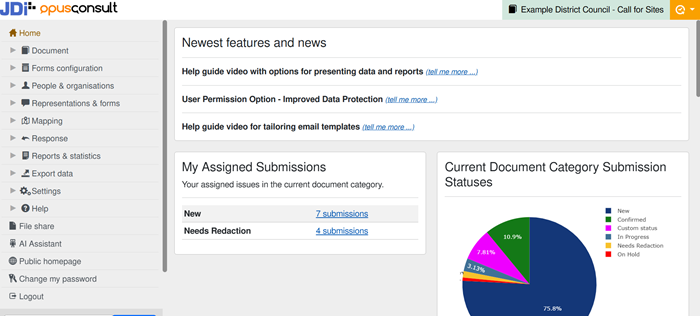
If you're part of a Local Plan team, you already know how complex the plan-making process can be - balancing evidence, policy drafting, stakeholder engagement, and statutory requirements. Throw in clunky digital tools that aren’t designed for local plan-making, and the pressure only increases.
That’s why so many planning policy teams are exploring purpose-built, user-friendly Local Plan consultation platforms - with tools that not only streamline workflows but also empower teams to do more of what they joined the council to do: plan.
Here’s why switching to a modern, purpose-built Local Plan consultation platform can make a real difference.
1. Streamline the entire consultation journey
Generic systems can only do so much - often forcing you to juggle multiple tools or move documents between formats. Purpose-built platforms like OpusConsult (alongside OpusMap) cover every stage - from evidence gathering, call for sites, draft plan consultations, to examination and adopted plan publication.
- At Powys County Council, planners were able to run their Candidate Sites consultation online - including interactive site plan uploads, meaning submissions and maps flowed into one shared system. Minimal manual digitising from limited offline submissions, no time lost switching between platforms.
2. Build smarter consultations that capture the right data
Generic consultation software often limits how you collect and structure information. With tailored platforms, you can customise forms and choose which parts of the document to welcome comments, to gather exactly what you need.
- Powys’s team used OpusConsult’s custom form builder with dependency logic. They asked supplementary questions automatically when, for instance, a site intersected a flood zone - prompting proposers to upload flood risk assessments right when they submitted.
From your point of view, that means fewer follow-ups, fewer delays, and more complete submissions - right from the outset.
3. Inclusive and accessible engagement - for everyone
Your goal is broad, meaningful engagement - and that means making consultation easy for all.
- The Opus System is web-based, accessible 24/7 via browser or mobile, and complies with accessibility regulations. That removes barriers for residents and helps teams meet legal standards.
Easy-to-use, accessible platforms mean more people participate - and you get a richer, more representative evidence base to support your policies.
4. Massive time savings where it matters most
Manual data entry is a drain on people resource and subsequently on squeezed budgets.
- Powys received 303 site submissions. Of those, 92% were submitted online. That meant the team spent just two weeks digitising the rest, compared to 2-3 months under the previous approach.
Imagine what you could do with that time - more policy focus, more community outreach, or improved evidence analysis.
5. Future-ready and built with you in mind
Planning rules and public expectations are evolving quickly. Investing in the right plan-making consultation platform helps you stay responsive - not reactive.
- Powys chose the Opus System because it met ICT requirements, supported Welsh language, GDPR, accessibility, and offered ongoing effective support. The system also supports hybrid working and future needs like managing a Candidate Sites Register.
That kind of forward-thinking flexibility gives teams confidence - not just for now, but for future plan cycles.
6. Empowered teams, better outcomes
Ultimately, your team’s expertise is planning - and that’s what you should focus on.
Purpose-built Local Plan consultation platforms remove admin hurdles and technical friction, helping teams spend time where it counts. More efficient processes mean more meaningful consultations and stronger plans - and when communities see that care, trust grows.
POWYS COUNTY COUNCIL CASE STUDY SNAPSHOT
Challenge 1: Manual digitising of paper/PDF submissions.
Outcome with the Opus System: 92% of sites submitted online; digitising done in 2 weeks instead of 2-3 months.
Challenge 2: No constraints map at point of submission.
Outcome with the Opus System: Interactive Constraints Map enabled real-time location questions.
Challenge 3: Generic, one-size-fits-all toolset.
Outcome with the Opus System: Custom form and dependency logic captured accurate data early.
Challenge 4: ICT, language, accessibility compliance unknown.
Outcome with the Opus System: Fully compliant, hybrid-friendly system out of the box.
Read the full case study on how a Welsh council made significant savings delivering Call for Sites consultation digitally.
Final thought
If your current consultation tools feel like they were never designed to genuinely support plan-making, it might be time for a change. A purpose-built, accessible, and intuitive platform gives your team efficiency, flexibility, and the confidence to do planning the way it should be done.
Get in touch to arrange a free guided demo of the Opus System.